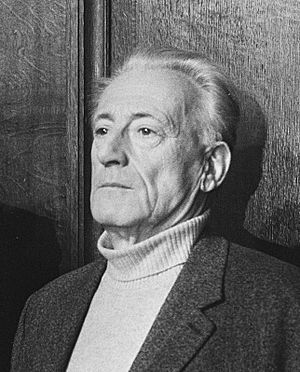Henri Lefebvre facts for kids
Quick facts for kids
Henri Lefebvre
|
|
|---|---|

Lefebvre in 1971
|
|
| Born | 16 June 1901 Hagetmau, France
|
| Died | 29 June 1991 (aged 90) Navarrenx, France
|
| Alma mater | University of Paris (MA, 1920; DrE, 1954) |
| Era | 20th-century philosophy |
| Region | Western philosophy |
| School | Continental philosophy Western Marxism Hegelian Marxism |
| Doctoral students | Jean Baudrillard |
|
Main interests
|
|
|
Notable ideas
|
|
|
Influenced
|
|
Henri Lefebvre (born June 16, 1901 – died June 29, 1991) was an important French thinker. He was a philosopher and a sociologist. Lefebvre is famous for his ideas about "everyday life" and how cities are built.
He also introduced concepts like the "right to the city" and the "production of social space." He wrote many books and articles. His work helped shape how people think about society, cities, and how we live our daily lives.
Contents
Henri Lefebvre's Life Story
Henri Lefebvre was born in a town called Hagetmau in France. He studied philosophy at the University of Paris and finished his degree in 1920. In the 1920s, he joined a group of thinkers. They wanted to create a "philosophical revolution."
This group connected with artists and writers, like the Surrealists. Later, Lefebvre joined the French Communist Party (PCF) in 1928. He became a leading Marxist thinker in France. He also joined the French resistance during World War II.
From 1944 to 1949, he worked as a director for a French radio station. One of his important books was Dialectical Materialism (1940). It was against the ideas of Stalinism. In 1947, he published the first part of his famous work, The Critique of Everyday Life.
Lefebvre was a member of the Communist Party for 30 years. He was asked to write criticisms of other thinkers. But he had his own strong ideas. Because of his different views, he was asked to leave the party in the late 1950s. After that, he became a major critic of the party's policies.
In 1961, Lefebvre became a professor of sociology at the University of Strasbourg. Later, in 1965, he joined the new university at Nanterre. He was a respected professor. His ideas influenced the student protests in May 1968.
In 1968, he wrote the book Le Droit à la ville, which means The Right to the City. This book introduced the idea that everyone should have a right to city life. After this, he wrote many important books about cities and space. His book The Production of Space (1974) became very influential.
Henri Lefebvre passed away in 1991. He was 90 years old. Many people remember him for his long career. His ideas influenced not only philosophy but also sociology, geography, and political science.
Lefebvre's Key Ideas
Understanding Everyday Life
One of Lefebvre's most important ideas is the "critique of everyday life." He started developing this idea in the 1930s. He saw everyday life as a mix of truth and illusion. It was where people had both power and helplessness.
He believed that everyday life is where all our activities happen. It's the space where we live our daily routines. Lefebvre thought that everyday life was not fully explored or understood. He felt that in the mid-20th century, capitalism started to control it more.
He argued that if people looked closely at their daily lives, they would see problems. For example, they might feel bored even though society promised them free time. This understanding could lead people to change their everyday lives.
Lefebvre believed this was important because capitalism uses everyday life to keep itself going. If people don't change their daily lives, capitalism will continue to make them worse. It would also stop people from truly expressing themselves. He thought that improving human life was more important than just controlling factories.
Lefebvre's ideas about everyday life were very important in France. They influenced the student protests of May 1968. His later work also influenced how people think about digital technology today. He discussed how technology can "colonize" our daily lives.
How Social Space is Made
Lefebvre also wrote a lot about the importance of space. He believed that space is not just an empty area. Instead, it is "produced" by society. This means that space is shaped by our values and how we interact.
He explained that different societies create different kinds of space. For example, natural spaces are different from city spaces. The meaning of spaces changes based on how people use them.
Lefebvre said that every society creates its own unique space. This space is a complex social creation. It is based on shared values and meanings. This social space then affects how people act and what they see.
Some thinkers have criticized Lefebvre's ideas about space. However, his work remains very important. It helps us understand how our surroundings are shaped by society. It also shows how these spaces, in turn, affect us.
See also
 In Spanish: Henri Lefebvre para niños
In Spanish: Henri Lefebvre para niños

